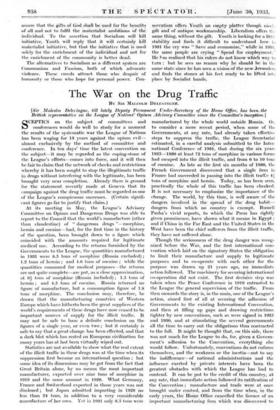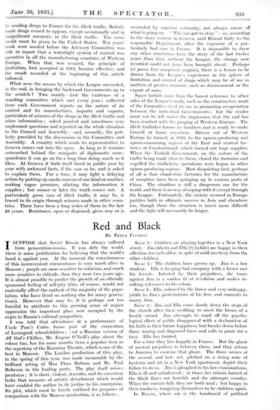The War on the Drug Traffic By SIR MALCOLM DELEVINGNE.
[Sir Malcolm Delevingne, till lately Deputy Permanent Under-Secretary of the Home Office, has been the British repres-entative on the League of Naliansi Opium Advisory Committee since the Committee's inception.] CEPTICS on the subject of committees and . conferences would do well to study for a- moment the results of the systematic war the League of Nations has been waging for .13 years against the opium evil— almost exclusively by the method of committee and In ten days' time the latest convention on the subject—it may be regarded as the coping-stone of the League's effOrts—ccimes into force, and it will then be fair to claim that the network of checks andrestrictions whereby it has been sought to stop the illegitimate traffic in drugs without interfering with the legitimate, has been brought very near completion: Already there is ground.. for the statement . recently made at Geneva that its campaign against the drug traffic must be regarded as one of the League's .conspicuous successes. .(Certain signifi- cant figures go far to justify that claim.) .
At its meeting in May, the League's Advisory Committee on Opium and Dangerous Drugs was able to report to the Council that the world's manufacture (other than clandestine) of "dangerous drugs "—morphine; heroin and cocaine—had, for the first time in the 'history of the question, been brought down to a figure which coincided with the amounts required for legitimate medical use. According to the returns furnished by the Governments to the League, the quantities manufactured in 1931 were 8.5 tons of morphine (Russia excluded) ; 1.2 tons of heroin ; and 4.6 tons of cocaine ; while the quantities consumed for medical purposes—the returns are not quite complete—are put, as a close approximation, at 91 tons of morphine (Russia included) ; 1.5 tons of heroin ; and 4.5 tons of cocaine. Russia returned no figure of manufacture, . but a consumption figure of 1.8 tons of morphine. The conclusion may, therefore, be drawn that the manufacturing countries of Western Europe which have hitherto been the great suppliers of the world's requirements of these drugs have now ceased to be important sources of supply for the illicit traffic. It may not be safe to base a definite conclusion on the figures of a single year, or even two ; but it certainly is . safe to say that a great change has been effected, and that a dark blot which has rested on European civilization for many years has at last been virtually wiped out.
Statistics are not available to show what the real extent of the illicit traffic in these drugs was at the time when its suppression first became an international question ; but some idea of its dimensions may be got from the fact that Great Britain alone, by no means the most important manufacturer, exported over nine tons of morphine in 1919 and the same amount in 1920. What Germany, France and Switzerland exported in those years was not disclosed ; but Japan admitted importing in 1920 no less than 24 tons, in addition to a very considerable manufacture of her own. Yet in 1931 only 8.5 tons were manufactured by the whole world outside Russia. Or, to consider a- more recent period, - when . some of the Governments, at any . rate, had already taken effective steps to suppress the traffic, the League Secretariat estimated, in a careful analysis submitted to the Inter- national Conference - of 1981, that during the six years 1925-1930 at least 72 tons of morphine in various forms had escaped into the illicit traffic, and from 6 to 1.0 to* of cocaine. As late as the first Six Months. of 1980, the French Government discovered that a Single firm in France had succeeded in passing into the illicit traffic 41 tons of morphine and heroin. Today, as has been seen, practically the whole of this traffic has been checked. It is not necessary. to emphasize the importance of the • change. The world, by this time, is well aware of the dangers involved in the spread of . the drug habit— dangers from which no country is exempt. RuSsell Pasha's vivid reports, to which the PreSS has rightly given prominence, have shown what it means in Egypt ; and if China in- the Far East and the United States in the West have been the chief sufferers from the illicit traffic, they have not suffered alone.
Though the seriousness of. the drug danger was recog- nized before the War, and the first international con- vention which laid on the signatory States the obligation to limit their manufacture and supply to legitimate purposes and to co-operate with each other for the purpose was drawn. up 21 years ago, no immediate action followed. The machinery for securing international co-operation did not exist. The first decisive Step was taken when the Peace Conference in 1919 entrusted to the League the general supervision of the traffic. From then onwards the story is, in the main,one of the L.eagne's action, aimed first of -all at securing the adhesion Of Governments to the existing International Convention, and then at filling up gaps and drawing restrictions tighter by new conventions, such as were signed in 1925 and 1930, and at stimulating the several governments all the time to carry out the obligations thus contracted to the full. It might be thought that, on this side, there was not much for the League to do, for, given a Govern- ment's adhesion to the Convention, everything else -would follow. Unfortunately, conventions do not enforce themselves, and the weakness or the inertia—not to say the indifference—of national administrations . and the influence exerted byprivate interests have been the greatest obstacles with which the League has . had to contend. It can be put to the credit of this country, at any rate, that immediate action followed its ratification of the Convention ; manufacture and -trade were at once brought under control, and from the time when; in the early years,, the Home Office cancelled the licence of an important, manufacturing firm which was discovered to be sending drugs to France for the illicit traffic, British- made drugs ceased to appear, except occasionally and in insignificant amounts, in the illicit traffic. The same credit must be given to the United States. Ten years' work were needed before the Advisory Committee was able to report that a watertight system of control was operative in all the manufacturing countries of Western Europe. When that was secured, the principle of limitation, first accepted in 1912, became effective, and the result recorded at the beginning of this article followed.
What were the means by which the League succeeded, in the end, in bringing the backward Governments up to the scratch ? Two mainly—first the existence of a standing committee which met every year ; collected from each Government reports on the nature of its control and its manufactures, imports and exports, particulars Of seizures of the drugs in the illicit traffic and other information ; asked pointed and sometimes very unpleasant questions and reported on the whole situation to the Council and Assembly : and, secondly, the pub- licity Provided by the discussions in the Committee and Assembly. A country which sends its representative to Geneva comes out into the open. As long as it remains entrenched behind the ramparts of diplomatic corre- spondenee it can go on for a long time doing much as it likes. At Geneva it finds itself faced in public year by year. With awkward facts, if the ease so be, and is asked to explain them. For a time, it may fight a delaying action by putting up smoke-screens of one kind or another, making vague promises, stinting the information it supplies ; but. sooner or later the truth comes out. A particularly gross case of illicit traffic, it may be, is traced to its origin through seizures made in other coun- tries. There have been a long series of them in the last 10 years. Resistance, open or disguised, gives way or is overruled by superior authority, not always aware of what is going on. "This has got to stop "—so, according to the story current. in Geneva, said Briand flatly to the responsible Department, after the exposure of a par- ticularly bad ease in France. It is impossible to draw any other conclusion from the story of the last twelve years than that, without the League, the change now recorded could not have been brought about. Perhaps (si parra licet compouere magnis), there is a lesson to be drawn from the League's experience in the sphere of limitation and control of drugs which may be of use in matters of greater moment, such as disarmament or the export of arms.
,Space forbids more than the barest reference to other sides of the League's work, such as the constructive work of the Committee or of its use in promoting co-operation between the individual Governments ; but the reader must not be left under the impression that the end has been reached with the purging of Western Europe. The illicit trafficker knows no frontiers and is ready to make himself at home anywhere. Driven out of Western Europe he turned, in 1929, to the opium-producing and Opium-consuming regions of the East and started fac- tories at Constantinople which turned out huge supplies.
When the Turkish Government, on the nature of the traffic being made clear to them, closed the factories and expelled the traffickers, operations were begun in other opium-producing regions. Most disquieting fact, perhaps of all is that clandestine factories for the manufacture of morphine have been springing up in various parts of China. The situation is still a dangerous one for the world, and there is no way of coping with it except through the League. Fortunately, the victory secured in Europe justifies faith in ultimate success in Asia and elsewhere too, though there the situation is much more difficult and the fight will necessarily be longer.











































 Previous page
Previous page